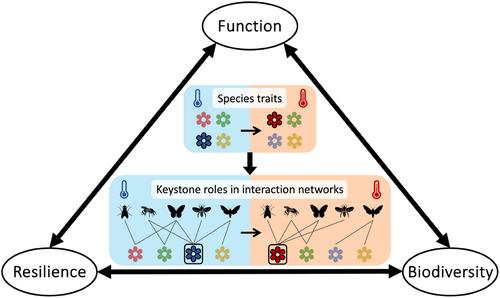Journal of Ecology ( IF 5.3 ) Pub Date : 2024-06-24 , DOI: 10.1111/1365-2745.14353 Nicole E. Rafferty 1 , Christopher T. Cosma 1

|
1 INTRODUCTION
As anthropogenic global change continues to threaten biodiversity and the provision of ecosystem services, nature-based solutions (NBS) seek to integrate societal and ecological aspects of environmental problems, thereby benefiting humans while minimising ecosystem degradation (Seddon, 2022). NBS are broadly defined as actions that seek to simultaneously secure the provision of ecosystem services for human wellbeing while protecting biodiversity, with the ultimate goal of sustainable development over the long-term (Seddon et al., 2021). Despite recognition that ecosystem services rely on biodiversity conservation, NBS generally have not given sufficient attention to the biodiversity half of these interconnected objectives, particularly in the context of climate change adaptation (Mori, 2020). Although they encompass ecosystems of all types, at their core, many NBS depend upon plants that, in turn, depend upon pollinators. For example, some NBS that focus on carbon sequestration, such as mangrove reforestation, rely on animal-pollinated plants, as do solutions that focus on the provision of other ecosystem services, such as crop production and nutrient cycling via leguminous forbs (Aluri, 2022; Everwand et al., 2017; Garibaldi et al., 2016). Therefore, sustained success of NBS depends upon resilient pollinator communities.
However, amid the ongoing global decline of insects (Wagner et al., 2021), populations of many insect pollinators, such as bees (Cameron & Sadd, 2020), butterflies (Forister et al., 2021) and moths (Fox, 2013), have plummeted in recent decades. These declines highlight the interconnected nature of plant and pollinator conservation. The reproduction of almost 90% of angiosperms and 70% of the main human food crops are tied to the animals that pollinate them (Klein et al., 2007; Ollerton et al., 2011), and pollinator fitness is tied to floral resource availability (Stuligross & Williams, 2020). Thus, the global change-driven loss of pollinators represents both the loss of biodiversity and the loss of a critical ecosystem service. Indeed, one of the primary mechanisms by which global change will impact ecosystem services is through the disruption of species interactions, including plant-pollinator interactions (Traill et al., 2010). Interactions can also be lost more quickly than species themselves, disrupting ecosystem function before species become locally extinct (Tylianakis et al., 2010; Valiente-Banuet et al., 2015). It is therefore increasingly recognised that conserving species interactions is essential for protecting biodiversity, securing ecosystem function and sustaining resilience under environmental change (Andresen et al., 2018; Bascompte & Scheffer, 2023; Heinen et al., 2020; Qian & Akçay, 2020).
To maintain NBS under future climatic conditions, we contend that we must apply our understanding of the ecology of plant-pollinator mutualisms to the implementation of solutions that involve animal-pollinated plants. We first present the results of a literature survey to quantify how often plant-pollinator interactions are considered in the design, implementation, or evaluation of NBS involving plants. We use this survey to motivate our suggestion that identifying keystone plants and pollinators in interaction networks can aid in managing NBS for the provision of pollination services. We further suggest that a phylogenetic, trait-based approach can help us to understand the characteristics associated with keystoneness, and then to forecast how those traits might change under future climates. By better understanding species and interactions of outsized importance to their communities, we can better anticipate the consequences of climate change for NBS that rely on pollination. Thus, the longer-term value of NBS that explicitly incorporate plant-pollinator interactions can be borne out in the emergent properties they generate: resilient interaction networks that provide pollination services under global change.
中文翻译:

基于自然的可持续解决方案需要建立和维护关键的植物与传粉媒介相互作用
1 引言
随着人为全球变化继续威胁生物多样性和生态系统服务的提供,基于自然的解决方案 (NBS) 寻求整合环境问题的社会和生态方面,从而造福人类,同时最大限度地减少生态系统退化(Seddon,2022 年)。基于自然的解决方案被广泛定义为寻求在保护生物多样性的同时确保为人类福祉提供生态系统服务的行动,其最终目标是长期可持续发展(Seddon et al., 2021)。尽管认识到生态系统服务依赖于生物多样性保护,但 NBS 通常没有对这些相互关联的目标中的生物多样性部分给予足够的重视,尤其是在适应气候变化的背景下(Mori,2020)。尽管它们涵盖了所有类型的生态系统,但从本质上讲,许多基于自然的解决方案依赖于植物,而植物又依赖于传粉媒介。例如,一些专注于碳封存的解决方案,如红树林再造林,依赖于动物授粉植物,专注于提供其他生态系统服务的解决方案也是如此,如作物生产和通过豆科杂草进行养分循环(Aluri,2022;Everwand等人,2017 年;Garibaldi et al., 2016)。因此,基于自然的解决方案的持续成功取决于有弹性的传粉媒介群落。
然而,在全球昆虫数量持续减少的情况下(瓦格纳等人,2021年),许多昆虫传粉者的数量,如蜜蜂(卡梅隆和萨德,2020年)、蝴蝶(福里斯特等人,2021年)和飞蛾(福克斯,2013年),近几十年来急剧下降。这些下降凸显了植物和传粉媒介保护的相互关联性。近 90% 的被子植物和 70% 的人类主要粮食作物的繁殖与为它们授粉的动物有关(Klein 等人,2007 年;Ollerton et al., 2011),而传粉媒介的适应性与花卉资源的可用性有关(Stuligross & Williams, 2020)。因此,全球变化驱动的传粉媒介丧失既代表了生物多样性的丧失,也代表了关键生态系统服务的丧失。事实上,全球变化影响生态系统服务的主要机制之一是破坏物种相互作用,包括植物与传粉媒介的相互作用(Traill et al., 2010)。相互作用也可能比物种本身更快地丢失,从而在物种局部灭绝之前破坏生态系统功能(Tylianakis 等人,2010 年;Valiente-Banuet et et et al., 2015)。因此,人们越来越认识到,保护物种相互作用对于保护生物多样性、确保生态系统功能和在环境变化下保持复原力至关重要(Andresen et al., 2018;Bascompte & Scheffer, 2023;Heinen et al., 2020;Qian & Akçay,2020 年)。
为了在未来的气候条件下维持基于自然的解决方案,我们认为我们必须将我们对植物-传粉媒介共生生态学的理解应用于涉及动物授粉植物的解决方案的实施。我们首先提出了文献调查的结果,以量化在设计、实施或评估涉及植物的 NBS 时考虑植物与传粉媒介相互作用的频率。我们利用这项调查来激发我们的建议,即在互动网络中识别关键植物和传粉媒介有助于管理 NBS 以提供授粉服务。我们进一步建议,系统发育的、基于性状的方法可以帮助我们理解与关键性相关的特征,然后预测这些性状在未来气候下可能如何变化。通过更好地了解对其群落具有极重要性的物种和相互作用,我们可以更好地预测气候变化对依赖授粉的 NBS 的影响。因此,明确纳入植物-传粉媒介相互作用的 NBS 的长期价值可以在它们产生的新兴特性中得到证实:在全球变化下提供授粉服务的弹性相互作用网络。































 京公网安备 11010802027423号
京公网安备 11010802027423号